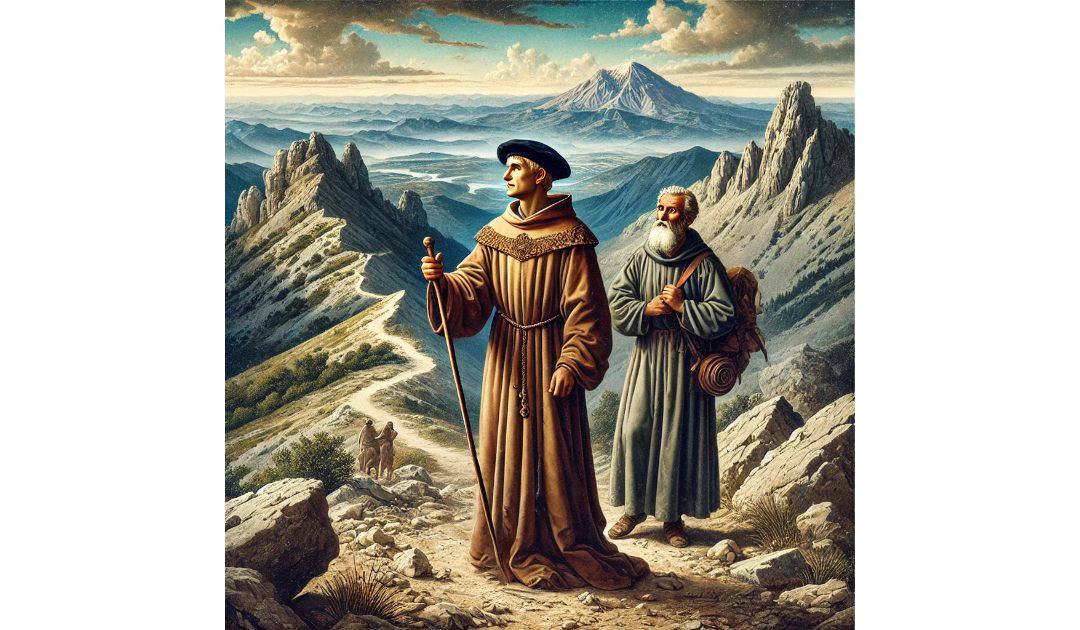On the 26th of April 1336, the Italian scholar and poet Francesco di Petracco, Petrarch, climbed Mont Ventoux for pleasure, which made him the first tourist. I have written about Petrarch before, but hadn’t been aware that he started tourism, as well as his many other accomplishments.
Francesco Petrarch, an Italian scholar, poet, and early humanist, is often credited as one of the cornerstones of the Renaissance. Born in 1304 in Arezzo, Italy, Petrarch’s intellectual pursuits and literary contributions laid the groundwork for Renaissance humanism, a movement that shifted the focus from medieval scholasticism to the study and celebration of classical antiquity. However, Petrarch’s significance extends beyond his scholarly and poetic achievements; he is also regarded as the world’s first tourist, a trailblazer in the exploration of landscapes for pleasure rather than necessity.
Petrarch’s most enduring legacy is his contribution to literature, particularly through his development of the sonnet form. His “Canzoniere,” a collection of 366 poems, primarily sonnets, remains a seminal work in Western literature. This collection, inspired by his unrequited love for Laura, a woman he saw but never truly knew, explores themes of love, longing, and human emotion. Petrarch’s sonnets transformed the vernacular, proving that the Italian language could be as sophisticated and expressive as Latin. This innovation directly inspired later poets, including Shakespeare, who adopted and adapted the Petrarchan sonnet form.
Beyond poetry, Petrarch played a pivotal role in the revival of classical texts. His passion for the ancient world led to the rediscovery of many forgotten works of Roman and Greek literature. Petrarch’s relentless search for classical manuscripts ensured the survival of Cicero’s letters and other critical texts, which he meticulously copied and circulated. This dedication to classical learning made him a central figure in the development of Renaissance humanism, a movement that emphasized the value of human achievements, the study of classical antiquity, and the potential for human progress through education.
While Petrarch is celebrated for his literary accomplishments, his role as the first tourist is a less discussed yet equally fascinating aspect of his life. Unlike many of his contemporaries, who traveled primarily for trade, pilgrimage, or warfare, Petrarch journeyed for personal enrichment and pleasure. He had an insatiable curiosity about the world, a desire to experience the landscapes and histories he read about in classical texts firsthand.
Petrarch’s ascent of Mont Ventoux in 1336 is often cited as the first recorded instance of travel for pleasure. Unlike previous climbs, which were made for religious or military reasons, Petrarch’s aim was purely aesthetic and intellectual. In a letter to his confessor, written after the climb, Petrarch reflected on the experience, drawing parallels between his physical ascent and spiritual journey. His introspective and philosophical musings during this expedition signify a transformative moment in the history of travel: the birth of tourism as an activity for personal and intellectual fulfillment.
Petrarch’s journeys across Europe were well-documented in his extensive correspondence, which provides insights into his thoughts and motivations. He traveled to France, Germany, and Spain, exploring cities, mountains, and ancient ruins. His experiences and observations were shared with friends and scholars, effectively broadening the intellectual horizons of his contemporaries and laying the groundwork for future travelers who sought knowledge and inspiration from the world around them.
Petrarch’s dual legacy as a father of humanism and a pioneer of tourism underscores his profound impact on Western culture. His revival of classical learning helped bridge the gap between the medieval and modern worlds, facilitating a cultural and intellectual awakening that transformed Europe. His poetic innovations not only enriched the Italian language but also set the stage for future literary achievements.
As the first tourist, Petrarch introduced the concept of travel as a means of personal growth and exploration. His journeys and reflections inspired others to venture beyond their immediate surroundings, to seek out new experiences and insights. In an era where travel was fraught with danger and difficulty, Petrarch’s choice to journey for pleasure and knowledge was revolutionary.

